5 takeaways from the second night of the RNC
The second night of the Republican National Convention appeared to be largely targeted at blue-collar workers whose votes, especially in swing states, are critical to President Trump’s reelection prospects. The primetime lineup featured a diverse mix of Trump supporters extolling what they saw as the president’s accomplishments in his first term — signing criminal justice reform, creating jobs — that by and large adhered to the night’s hopeful theme, “America, Land of Opportunity.”
Here are the key takeaways from day two of the RNC:
Man of the people
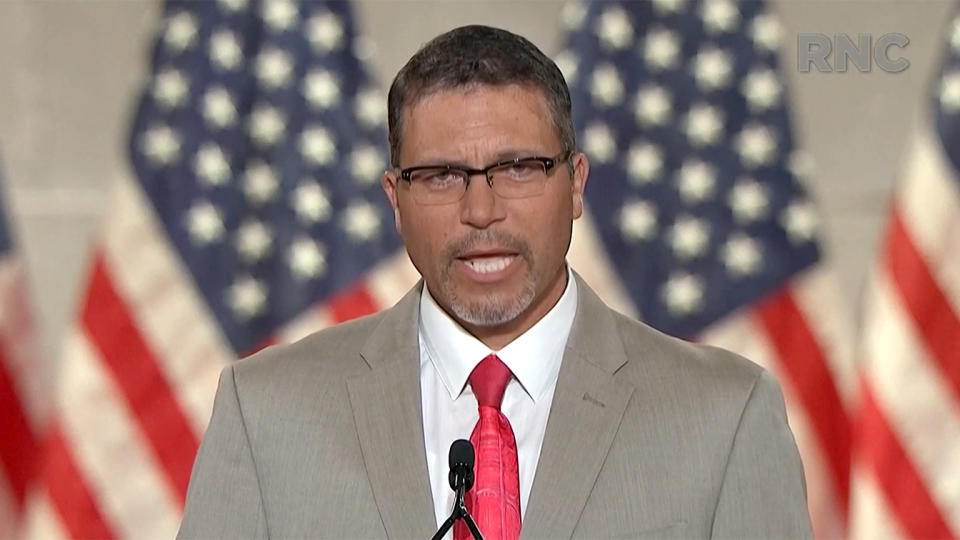
In 2016, Trump shocked the political world by winning Rust Belt states like Pennsylvania, Ohio, Michigan and Wisconsin. He did so by convincing voters that he was more in tune with the concerns of blue-collar voters than Hillary Clinton. This year, polls show Trump trailing Biden in several of the swing states he won in 2016, and the second night of the RNC appeared to be an effort to reverse that.
Speakers included ordinary Americans like Jason Joyce, a lobster fisherman from Swan’s Island, Maine.
“I have to confess: I didn’t support Trump in 2016. Skeptical that he shared my conservative views, I expected him to flip-flop on his campaign promises,” Joyce said. “But he has followed through on his promises, including last week, when he brokered a deal to end EU [European Union] tariffs of 8 percent on Maine live lobsters and up to 20 percent on Maine lobster products — which is great news for Maine's lobstermen.”
The deal was meant in part to offset large retaliatory tariffs imposed by China on imports of American lobsters in its ongoing trade war with the United States.
Cris Peterson, a dairy farmer from Grantsburg, Wisc., made the case that, despite retaliatory Chinese tariffs put in place in 2019 that have caused U.S. dairy exports to plummet, Trump is the candidate who is on her side.
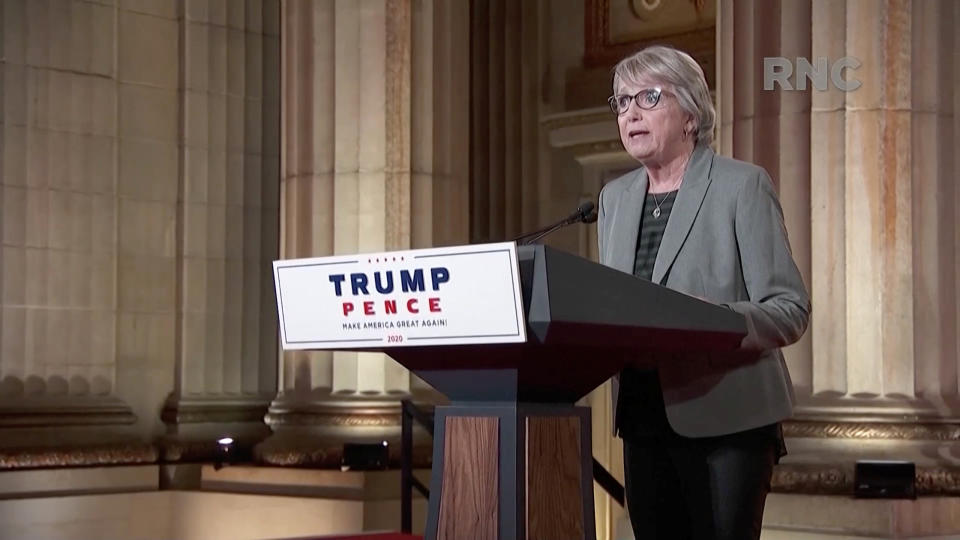
“As a businessman, President Trump understands that farming is a complicated, capital-intensive and risky business,” Peterson said. “More than any president, he has acknowledged the importance of farmers and agriculture.”
Pitching himself as a straight-talker, Larry Kudlow, director of the National Economic Council, also assured the convention audience that Trump deserved their vote.
“President Trump will always bet on the American worker. And that’s why the American worker — and the American voter — should always bet on him.”
It’s a family affair

Following Donald Trump Jr.’s heated denunciation of his father’s enemies on the first night of the convention, on Tuesday three more members of the president’s family took to the microphone on his behalf.
The president’s daughter Tiffany, who has remained almost entirely out of the public eye since she delivered a political speech during the 2016 Republican National Convention, praised her father for signing legislation on criminal justice reform and the Right to Try Act, which allows patients to access experimental drugs when conventional medications have failed. But the most notable portion of her speech was an attack on the media and “tech giants,” who, she claimed, are keeping Americans “mentally enslaved,” in a passage that evoked some of the tropes of conspiracy theories such as QAnon.
“Rather than allowing Americans the right to form our own beliefs, this misinformation system keeps people mentally enslaved to the ideas they deem correct.”
Trump’s son Eric, vice president of the Trump Organization, who asserted his Fifth Amendment rights last week to avoid submitting to an interview with New York’s Attorney General Letitia James, had much to say about his father on Tuesday.
“Every day, my father fights for the American people, the forgotten man and woman of this country, the ones who embody the American spirit, which is unlike anything else in the world,” he said.
James is investigating whether the Trump administration illegally inflated the value of Donald Trump’s assets in order to secure loans and secure tax benefits.
“Under President Trump, freedom will never be a thing of the past,” Eric Trump said. “That’s what a vote for Donald Trump represents.”
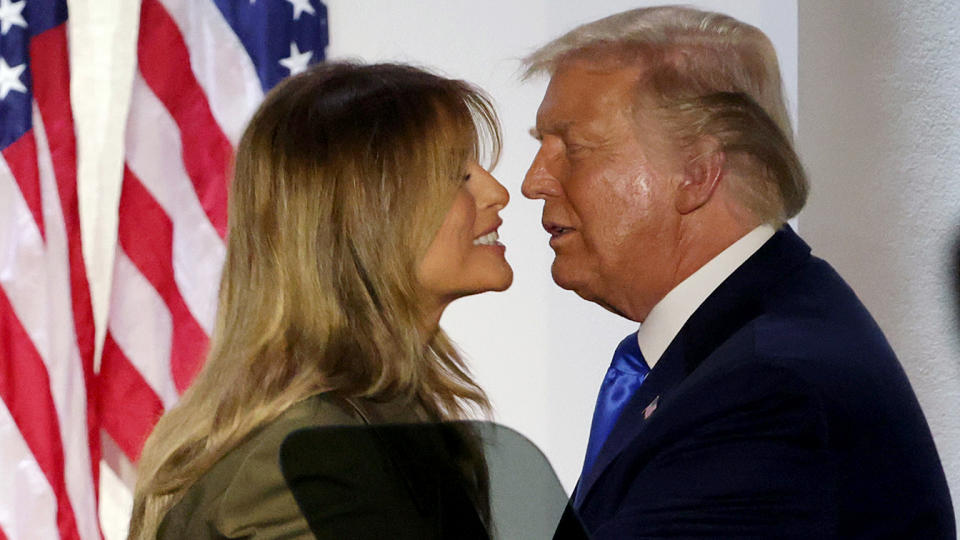
In one of the only speeches that discussed at any length the coronavirus pandemic, which has killed more than 178,000 Americans, Melania Trump, the president’s wife, spoke in the newly remodeled Rose Garden.
“I want to acknowledge the fact that since March, our lives have changed drastically. The invisible enemy, COVID-19, swept across our beautiful country and impacted all of us,” Melania Trump said. “My deepest sympathy goes out to everyone who has lost a loved one, and my prayers are with those who are ill or suffering. I know many people are anxious and some feel helpless. I want you to know you’re not alone.”
An immigrant to the United States from Slovenia, Melania Trump married Trump in 2005 before obtaining a green card five years later. “My husband knows how to make a real change. From the day that I met him, he has only wanted to make this country the best it can be,” she said, adding, “We will be honored to serve this incredible country for four more years.”
Nicholas Sandmann, culture warrior
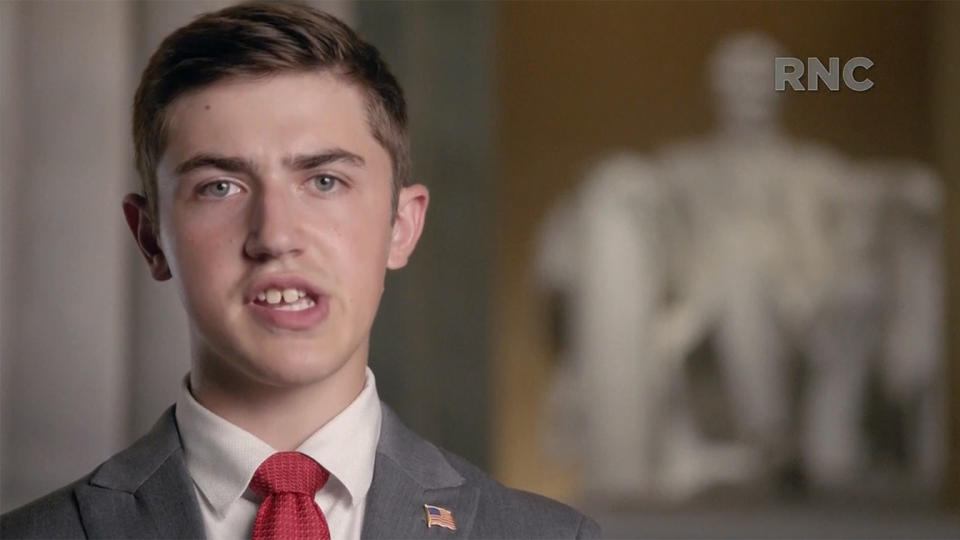
In 2019, Sandmann, an 18-year-old graduate of Covington Catholic High School in Covington, Ky., attended an anti-abortion rally in Washington, where he was videotaped in a staring match on the steps of the Lincoln Memorial with Nathan Phillips, a Native American activist. Footage of a portion of the encounter went viral, leading some news organizations to report that Sandmann, who was wearing a MAGA hat, was harassing Phillips.
A fuller account of the incident, as it emerged later, showed that the Covington students had been harassed by several Black Hebrew Israelites, and that Phillips had attempted to separate the groups. Exactly what transpired between Phillips and Sandmann remained ambiguous.
But to many people on the right, including the president, the portrayal of Sandmann as a smirking, entitled white youth was evidence of the media’s unquestioning bias.
Nick Sandmann and the students of Covington have become symbols of Fake News and how evil it can be. They have captivated the attention of the world, and I know they will use it for the good - maybe even to bring people together. It started off unpleasant, but can end in a dream!
— Donald J. Trump (@realDonaldTrump) January 22, 2019
Sandmann settled a lawsuit he brought against CNN and the Washington Post for an undisclosed sum, and on Tuesday, he appeared at the RNC to tell the story of all that he had been through.
“My life changed forever in that one moment. The full war machine of the mainstream media revved up into attack mode. They did so without ever researching the full video of the incident,” Sandmann said, “without ever investigating Mr. Phillips’ motives; or without ever asking me for my side of the story. And do you know why? Because the truth wasn’t important.”
The untrustworthiness of the media was a leitmotif of the evening.
“In November, I believe this country must unite around a president who calls the media out and refuses to allow them to create a narrative, instead of reporting the facts,” Sandmann said. “I believe we must join with a president who will challenge the media to return to objective journalism.”
Breaking precedent
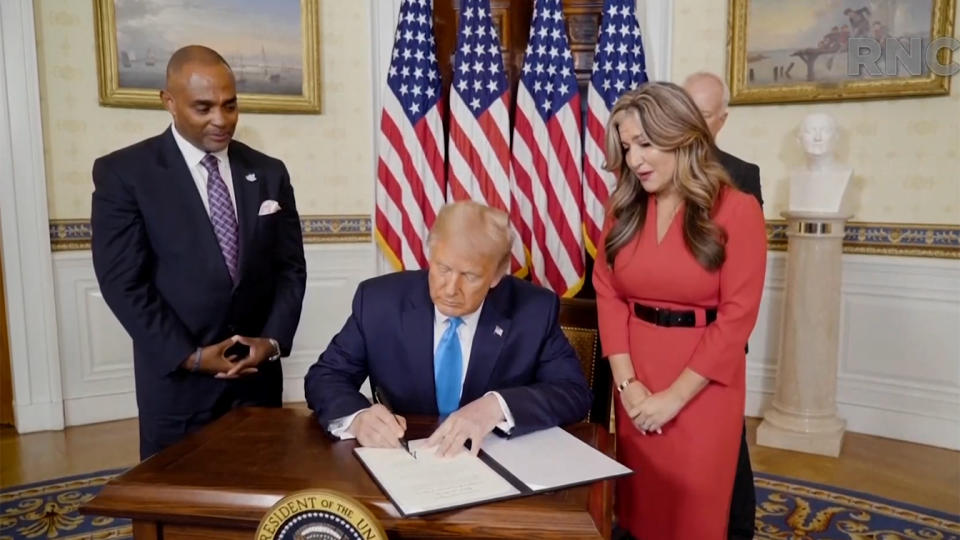
The second night of the RNC was full of firsts. It began with Trump using his convention to issue a pardon at the White House to Jon Ponder, a Nevada man jailed for bank robbery who later founded a nonprofit to help the incarcerated make the transition back to civilian life.
“I will continue to give all Americans, including former inmates, the best chance to build a new life and achieve their own American dream. And a great American dream it is,” Trump said in a video of the pardon.
Ponder praised the president during the ceremony, which was criticized by some as a politicization of Trump’s pardon power.
JON PONDER's story is inspirational.
But should he be endorsing a candidate for president while being identified as the founder & CEO of Hope for Prisoners, which -- as a 501(c)(3) non-partisan non-profit group -- is barred from participating in partisan politics? pic.twitter.com/HwFK1z8KlG— Kenneth P. Vogel (@kenvogel) August 26, 2020
Later in the evening, Trump used the White House as the setting for a naturalization ceremony for five immigrants granted citizenship to the U.S., another first for a political convention.
“You followed the rules, you obeyed the laws, you learned our history, embraced our values and proved yourselves to be men and women of the highest integrity,” Trump, who has sought to curtail immigration during his first term, told the new citizens.
In another break from past precedent, Secretary of State Mike Pompeo delivered an RNC address on Tuesday from Israel, where he was traveling on official state business.
“This president has led bold initiatives in nearly every corner of the world. In China, he’s pulled back the curtain on the predatory aggression of the Chinese Communist Party,” Pompeo said. “The president has held China accountable for covering up the China virus and allowing it to spread death and economic destruction in America and around the world.”
Pompeo did not specify what, exactly, Trump had done to hold the Chinese government accountable.
His speech also prompted Democrat Julián Castro, chairman of the House Foreign Affairs Oversight and Investigations Subcommittee to open an investigation. Citing a memo from the State Department’s Office of the Legal Adviser that found that “Senate-confirmed Presidential appointees may not even attend a political party convention or convention-related event,” let alone appear as a featured speaker, Castro sent a letter on Tuesday to Deputy Secretary of State Stephen Biegun.
“It is highly unusual, and likely unprecedented, for a sitting Secretary of State to speak at a partisan convention for either of the political parties. It appears that it may also be illegal,” Castro said in his letter.
Castro added that Pompeo’s speech “may violate the Hatch Act,” which prohibits federal employees from partaking in certain political activities.
Standout speaker
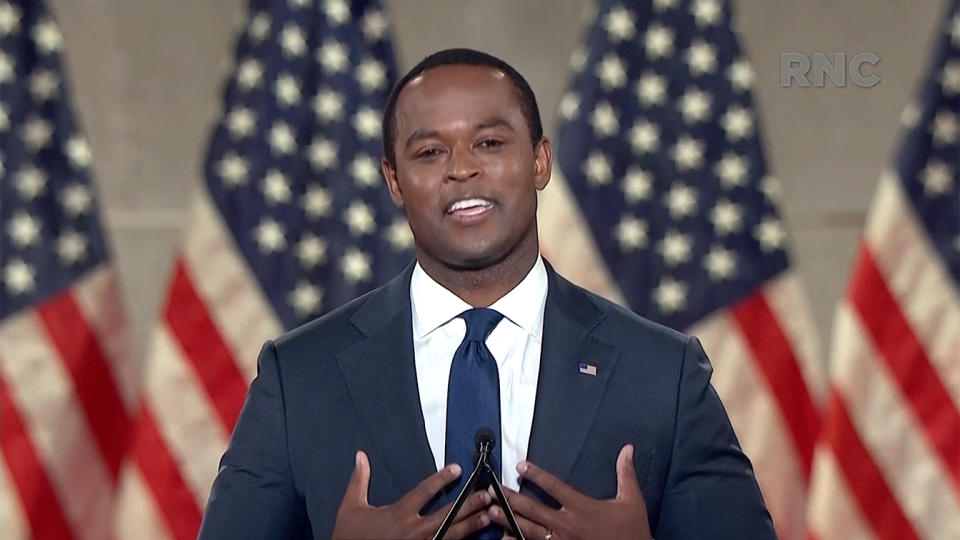
While the bulk of the speakers Tuesday night turned in solid, though not remarkable, performances, Kentucky’s attorney general, Daniel Cameron, proved the exception.
Cameron, the first African-American to serve in his post, described contemporary Republicans as the heirs of Abraham Lincoln, and brought up an infamous gaffe by Joe Biden, the Democratic nominee, who told a radio host, “If you have a problem figuring out whether you’re for me or Trump, then you ain’t Black.”
Biden later admitted that his remark was ill-advised and apologized, but Republicans weren’t about to let him forget it. “Mr. Vice President, look at me,” Cameron said. “I am Black, we are not all the same, sir. I am not in chains. My mind is my own, and you can’t tell me how to vote because of the color of my skin.
“Joe Biden is a backwards thinker in a world craving forward-looking leadership,” Cameron added. “There’s no wisdom in his record or plan, just a trail of discredited ideas and offensive statements.”
Perhaps the line of the night, however, was pitched to Democrats who might be underwhelmed by Biden’s nomination.
“Let’s be honest: No one is excited about Joe Biden. And so I ask you to judge the record,” Cameron said. “On criminal justice reform, Joe Biden couldn’t do it, but President Trump did. On the economy, Joe Biden couldn’t do it, but President Trump did build an economy that worked for everyone, especially minorities, and he will do it again.”
_____
Read more from Yahoo News:
You don't need the U.S. Postal Service to deliver your mail-in ballot
'I trusted them.' Some 'Build the Wall' donors feel cheated by Bannon. Some don't care.
Exclusive: DHS warns of fake election websites potentially tied to criminals, foreign actors
Oleandrin, touted as COVID-19 cure, has no scientific support


